Plumbers typically charge between £500 and £1,500 to fit a new boiler. The cost varies based on the boiler type—combi, system, or regular—and the installation's complexity. Factors like local labor rates and additional materials can also impact the final price. Investing in a qualified plumber guarantees compliance with safety standards, enhancing reliability. Understanding all associated costs is essential for proper budgeting. Keep exploring to uncover tips for making informed choices regarding your boiler installation.
Key insights
- Installation costs vary depending on the boiler type, with combi boilers generally having lower installation expenses than system or regular boilers.
- The complexity of the installation and necessary modifications can significantly increase overall costs.
- Regional labor rates influence pricing; urban areas may have higher installation costs than rural regions.
- Additional materials, permits, and system upgrades can contribute to the total installation price.
- Hiring a qualified plumber ensures compliance with safety standards and may come with warranties for added peace of mind.
Understanding Boiler Types and Their Costs
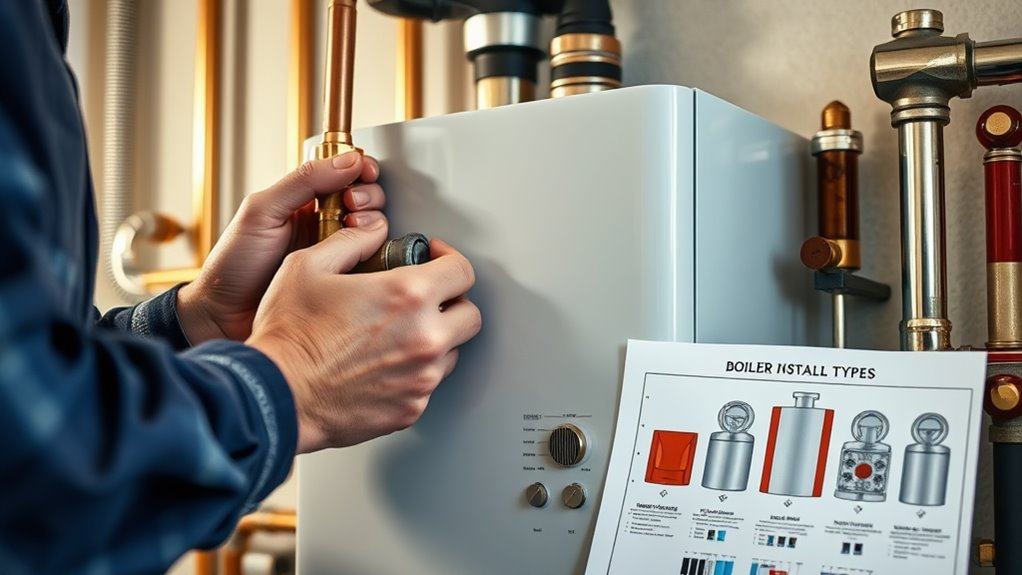
When considering a new boiler, it is crucial to understand the different types available and their associated costs. You'll typically encounter three main boiler types: combi, system, and regular. Combi boilers are compact and offer on-demand hot water, making them ideal for smaller homes. System boilers store hot water in a cylinder, providing a steady supply, while regular boilers are suited for larger homes with high hot water demands.
Installation costs vary depending on the type you choose. Combi boilers generally have lower installation costs due to their simpler setup. In contrast, system and regular boilers may incur higher installation costs because they require additional components like tanks and pipes. Understanding these differences helps you budget effectively for your new boiler. Additionally, consulting with qualified installers ensures compliance with local building codes and optimal setup for your system.
Factors Influencing Installation Prices
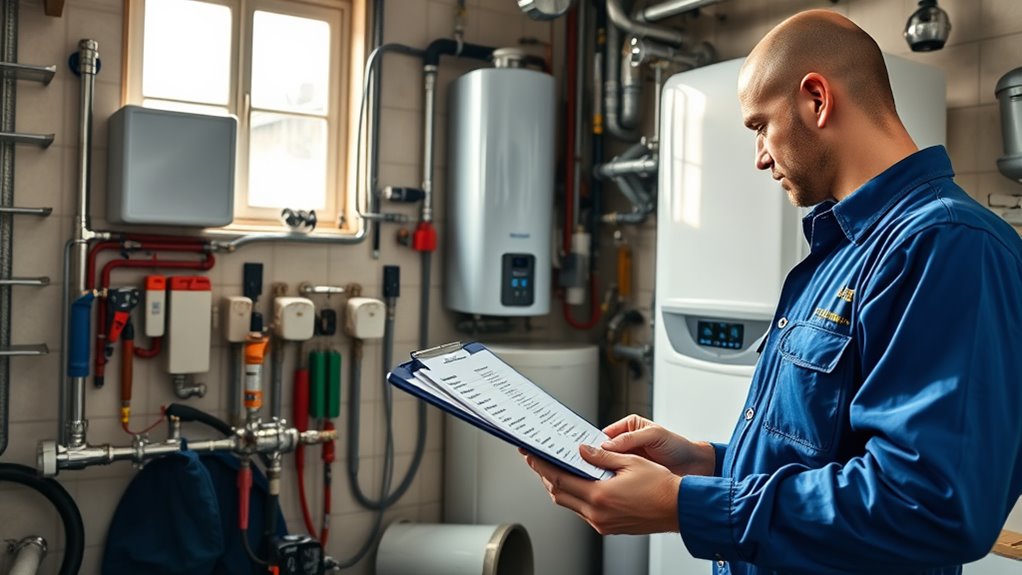
Several factors influence the installation prices of a new boiler, making it essential to take into account each aspect before committing. First, installation complexity plays a significant role; if your home requires extensive modifications to accommodate the new system, expect higher costs. Additionally, the quality of the equipment you choose directly affects the price. Premium boilers may have higher initial costs but often offer better efficiency and longevity, which can save you money in the long run. It's also important to contemplate local labor rates, as they can vary widely. By evaluating these factors, you can make a more informed decision and guarantee you're getting the best value for your investment in a new boiler. Regular commercial boiler service is also crucial for maintaining efficiency and preventing costly repairs.
Average Labor Costs for Boiler Installation
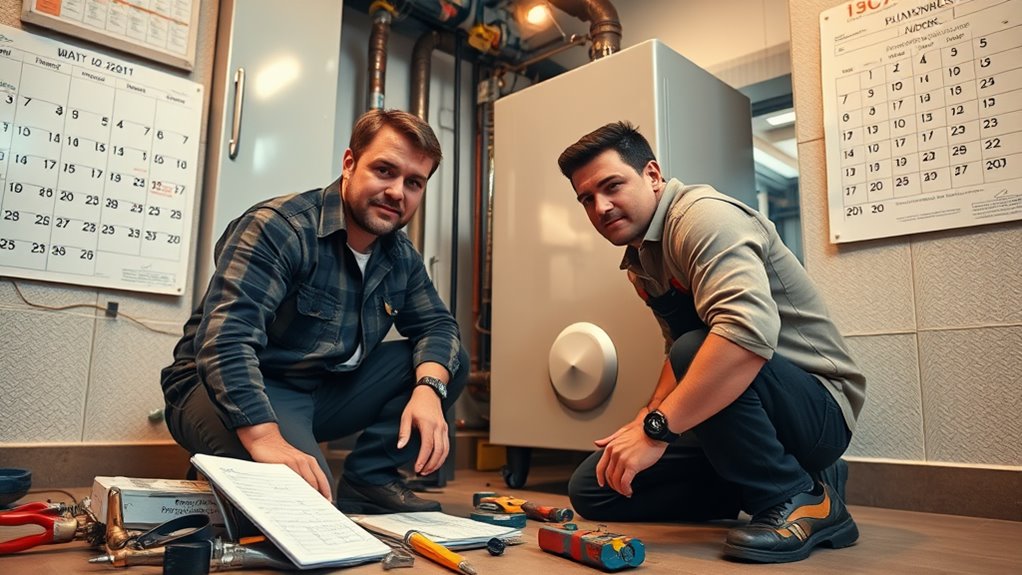
When considering boiler installation, you'll notice that labor costs can vary greatly by region. Factors such as local demand, the plumber's experience, and complexity of the job all influence the hourly rate. Understanding these variations can help you budget more effectively for your new boiler installation. Additionally, investing in energy-efficient heating systems can lead to long-term savings on utility bills, making the upfront costs more worthwhile.
Regional Price Variations
How do labor costs for boiler installation vary across different regions? Regional pricing plays an essential role in determining what you'll pay for labor. In urban areas where local demand for plumbing services is high, expect to see higher installation costs due to increased competition and overhead expenses. Conversely, in rural regions, you might find lower prices, but availability of skilled labor could be limited. For example, cities like London typically charge more than smaller towns. Factors such as local economic conditions and the density of service providers can greatly influence these costs. Understanding these regional variations helps you budget more accurately for your boiler installation and guarantees you select a qualified plumber within your area. Regular plant room maintenance is also a crucial consideration that can impact the overall efficiency and longevity of your boiler system.
Hourly Rate Factors
Labor costs for boiler installation depend on various factors beyond just regional pricing. One significant factor is the hourly wage of the plumber, which can vary widely based on the technician's experience level. A novice plumber might charge a lower rate, but their lack of experience could lead to longer installation times or errors that necessitate additional work. Conversely, a seasoned professional may command a higher hourly wage, but their expertise often results in quicker and more efficient installations. Additionally, the complexity of the installation and any necessary permits can also influence overall labor costs. Understanding these factors can help you budget effectively for your boiler installation project. Always consider both skill and cost when choosing a plumber. Regular inspections are essential for maintaining ongoing compliance and safety, which can also factor into the overall costs associated with boiler installations.
Additional Costs to Consider
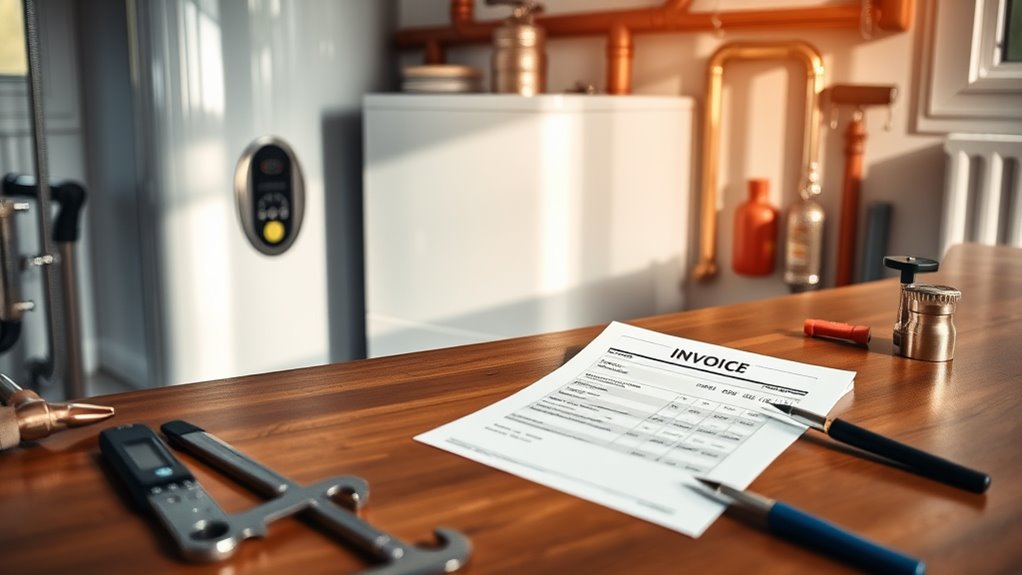
While fitting a new boiler often involves the primary costs of the unit and installation, you should also account for several additional expenses that can arise. Understanding these costs can help you budget effectively.
- Additional Materials: You may need pipes, fittings, or insulation, which can add to the overall expense.
- Installation Permits: Depending on local regulations, obtaining necessary permits can incur fees and may be required for legal compliance.
- System Upgrades: If your existing system needs modifications to accommodate the new boiler, this can lead to further costs. Regular inspections for leaks and unusual noises can also prevent unexpected expenses down the line.
The Importance of Choosing a Qualified Plumber
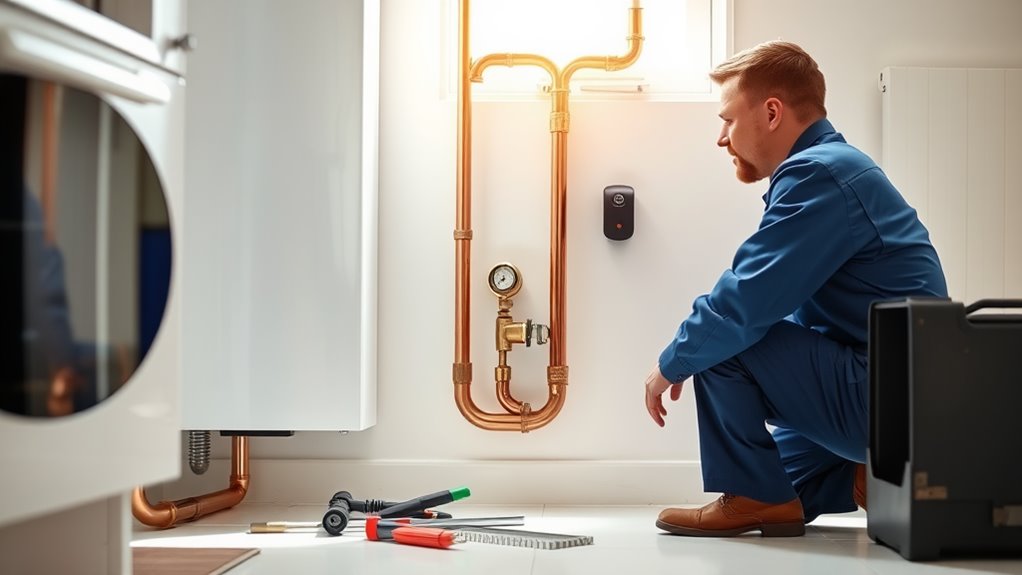
Choosing a qualified plumber is essential for ensuring compliance with safety standards and regulations. When you hire a professional, you're investing in long-term reliability and performance of your boiler. Making the right choice can prevent costly repairs and safety hazards down the line. Regular maintenance can also help catch potential issues early, ensuring your boiler operates efficiently and safely.
Ensured Safety Standards
When you hire a qualified plumber, you not only guarantee the efficiency of your new boiler installation but also safeguard your home against potential hazards. Adhering to safety regulations and installation standards is essential for ensuring a secure environment. Here are three reasons why choosing a qualified plumber matters:
- Expert Knowledge: Qualified plumbers are trained to understand complex safety regulations, ensuring compliance during installation.
- Risk Mitigation: Professional installation reduces the risk of leaks, explosions, or carbon monoxide poisoning, protecting you and your family.
- Insurance and Warranty: Many certified plumbers offer warranties on their work, giving you peace of mind knowing that any issues will be addressed without additional costs. Additionally, they can provide regular maintenance to prevent future breakdowns and ensure long-term efficiency of your heating system.
Long-term Reliability Benefits
Guaranteeing safety standards during boiler installation is just the beginning; long-term reliability hinges on the expertise of the plumber you select. A qualified plumber not only assures adherence to regulations but also makes certain your boiler operates at its peak. This expertise translates into increased efficiency, which directly impacts your energy bills. When your boiler runs efficiently, you enjoy long-term savings that add up over time. Additionally, an experienced plumber can identify potential issues early, preventing costly repairs down the line. By investing in a skilled professional, you secure a reliable heating system that maximizes performance and longevity. Ultimately, choosing the right plumber is vital for achieving both immediate satisfaction and long-term reliability benefits. Moreover, a qualified plumber can help ensure that common issues like low water pressure are addressed promptly to avoid future errors.
Comparing Quotes From Different Plumbers
As you evaluate quotes from various plumbers, it's crucial to reflect on not only the price but also the scope of work included in each proposal. A thorough quote comparison can help you make an informed decision. Here are three key aspects to contemplate:
- Plumber Credentials: Verify each plumber's qualifications and experience. A certified professional often guarantees higher quality work.
- Scope of Work: Review what's included in the quote—labor, materials, and any additional services. This can vary considerably between plumbers.
- Timeline: Take into account how long each plumber estimates the job will take. A quicker job might seem appealing but verify it doesn't compromise quality. Additionally, consider the potential benefits of energy-efficient heating solutions that can lead to long-term savings on energy bills.
The Role of Warranties and Guarantees
Warranties and guarantees play a critical role in the installation of your new boiler, offering you peace of mind and protection against potential defects. When selecting a boiler, understanding the warranty coverage is essential. Most manufacturers provide warranties that cover parts and labor for a specific period, typically ranging from two to ten years. Ascertain you review the guarantee terms closely, as they often outline conditions that must be met for the coverage to remain valid. This might include regular maintenance checks or professional servicing. By prioritizing warranty and guarantee details, you can mitigate future repair costs and enhance the longevity of your boiler system. Always ask your plumber about the specifics to ascertain you're fully informed before installation.
DIY vs. Professional Installation: What to Consider
When it comes to installing a new boiler, the decision between DIY and professional installation can greatly impact the overall effectiveness and safety of the system. You should weigh the following factors:
- DIY Challenges: Installing a boiler yourself can lead to unexpected complications, requiring specific skills and tools that you may not possess.
- Professional Advantages: Hiring a professional guarantees compliance with safety regulations and assures a high-quality installation, potentially saving you from costly repairs later.
- Installation Risks: Improper installation can lead to leaks, inefficient heating, or even hazardous situations like carbon monoxide poisoning.
Cost comparisons may seem appealing for DIY, but the long-term benefits of professional installation often outweigh initial savings. Prioritize safety and effectiveness when making your choice.
Tips for Finding a Reliable Plumber
Finding a reliable plumber can feel overwhelming, especially with so many options available. Start by checking online reviews on platforms like Google and Yelp, as they provide insights into previous customers' experiences. Look for consistent positive feedback, which can indicate a trustworthy professional. Next, verify the plumber's credentials. Confirm they're licensed and insured to operate in your area, as this protects you from liability in case of accidents. Additionally, ask for references from past clients to gauge their expertise and reliability. Finally, obtain multiple quotes to compare pricing and services offered. This will help you make an informed decision and guarantee you hire a plumber who meets your needs effectively.
Preparing Your Home for a New Boiler Installation
Before the installation of your new boiler, it's crucial to guarantee your home is properly prepared to facilitate a smooth process. You need to take into account several factors to meet the boiler space requirements and assure your existing system assessment is thorough.
- Clear the Area: Remove any furniture or obstacles around the installation site to give your plumber ample space to work.
- Check Access Points: Confirm that pathways, doors, and staircases are accessible for transporting the new boiler in and the old one out.
- Inspect Existing Systems: Have a qualified technician evaluate your current heating system to identify any necessary upgrades or modifications required for compatibility.
Frequently Asked Questions
Do Plumbers Charge Differently for Emergency Boiler Installations?
Yes, plumbers typically charge differently for emergency boiler installations. When you need urgent service, they often apply emergency rates, which can be considerably higher than standard rates. This reflects the installation urgency and the need for immediate attention. If your boiler fails unexpectedly, it's crucial to understand that you'll likely pay a premium for prompt service. Always ask for a breakdown of costs before proceeding to avoid any surprises.
Can I Finance My New Boiler Installation Costs?
Yes, you can finance your new boiler installation costs. Many companies offer boiler financing options that allow you to spread the expense over time. Installation payment plans typically have flexible terms, making it easier for you to manage your budget. Before selecting a plan, compare interest rates and repayment periods to find the best fit for your financial situation. Always read the fine print to understand any additional fees or conditions associated with the financing.
How Long Does a Boiler Installation Typically Take?
Typically, a boiler installation takes about 4 to 8 hours, depending on the boiler types and the complexity of the installation process. If you're switching from one type to another, it might take longer due to additional modifications needed. You should also consider any necessary permits and inspections, which can affect the overall timeline. Planning ahead will help guarantee a smoother and quicker installation experience for you.
What Qualifications Should I Look for in a Plumber?
When you're hiring a plumber, look for specific plumber certifications that demonstrate their expertise. Check if they have qualifications from recognized bodies, confirming they meet industry standards. Additionally, consider their plumbing experience; seasoned plumbers often handle unexpected issues more efficiently. Ask about previous projects similar to yours to gauge their skill level. By focusing on these aspects, you can confirm you're hiring a competent professional for your plumbing needs.
Are There Any Permits Required for Boiler Installation?
Yes, there are permits required for boiler installation, as compliance with boiler regulations is essential. You'll need to guarantee that your installation meets local building codes and safety standards. These permits typically verify that the installation adheres to proper installation standards, affirming safety and efficiency. It's wise to consult with your plumber, who should be familiar with the necessary permits and can guide you through the process to avoid any legal issues.
Summary
In summary, when fitting a new boiler, understanding costs and choosing a qualified plumber is essential. Labor rates can vary based on factors like boiler type and installation complexity. While DIY may seem tempting, professional installation guarantees safety and efficiency. Remember to factor in potential additional costs and warranties for long-term peace of mind. By taking the time to prepare your home and find a reliable plumber, you'll set yourself up for a successful boiler installation.

